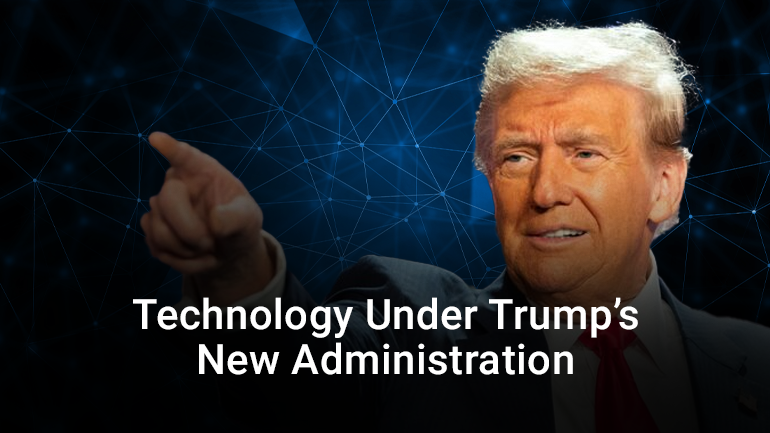
Introduction
As Donald Trump prepares to return to the White House in 2025, the technology industry braces for significant policy shifts that could reshape its future. From AI deregulation to a renewed focus on domestic manufacturing, the upcoming changes promise to redefine the dynamics of innovation, global competition, and ethical standards. This blog explores the potential impacts of these policy directions on businesses, developers, and the broader tech ecosystem.
Key Policy Shifts and Their Implications
1. Deregulation in Artificial Intelligence
The Trump administration is poised to adopt a hands-off regulatory approach to AI, encouraging innovation by reducing compliance barriers. This deregulation is expected to benefit startups and established enterprises by fostering rapid development and experimentation in AI technologies.
Potential Benefits:
- Accelerated innovation and reduced costs for AI-based solutions.
- Enhanced opportunities for small-scale AI developers to enter the market.
Concerns to Watch:
- Ethical implications of unchecked AI applications.
- Risks related to data misuse and biases in AI systems.
2. Revamping the CHIPS Act
The CHIPS and Science Act, designed to boost domestic semiconductor production, may undergo significant revisions under Trump. His administration is expected to focus on competitive manufacturing policies rather than blanket subsidies, addressing the root causes of offshoring.
Possible Changes:
- Incentives for smaller manufacturers to expand operations.
- Rebalancing the supply chain to reduce dependency on foreign semiconductors.
Impact:
- Potential innovation in chip design and production techniques.
- Short-term disruptions as supply chains adjust to new policies.
3. Big Tech and Antitrust Dynamics
While the Biden administration initiated aggressive antitrust actions against tech giants like Google and Meta, Trump’s administration may take a less confrontational stance. This could ease regulatory pressures on major players but might stifle competition for smaller tech firms.
Opportunities for Big Tech:
- Greater freedom to expand operations and acquire smaller startups.
- Reduced litigation costs and fewer operational constraints.
Challenges for Smaller Players:
- Limited access to market share in a monopolistic environment.
- Higher barriers to entry in key tech sectors.
4. National Security and Technology Policies
The intersection of national security and technology is expected to become a cornerstone of Trump’s administration. Stricter export controls on critical technologies and incentivized domestic innovation could shape the trajectory of sectors like AI, cybersecurity, and telecommunications.
Policy Highlights:
- Enhanced scrutiny of tech collaborations with foreign entities.
- Investments in cybersecurity tools to safeguard domestic infrastructure.
Implications:
- Growth opportunities for companies specializing in defense and cybersecurity technologies.
- Increased compliance requirements for international collaborations.
5. Energy-Intensive AI and Environmental Policies
The Trump administration’s lenient stance on environmental regulations may create opportunities for energy-intensive technologies like AI and blockchain to flourish without operational constraints. However, these benefits come with sustainability concerns that could affect long-term credibility.
Benefits:
- Reduced compliance costs for energy-intensive tech companies.
- Encouragement for competition in fields requiring substantial computational power.
Risks:
- Negative public perception regarding environmental accountability.
- Potential misalignment with global sustainability standards.
Opportunities for Businesses
While these policy shifts create an environment of uncertainty, they also present unique opportunities for businesses willing to adapt and innovate.
- Leverage Deregulation: Use reduced compliance barriers to speed up product development cycles.
- Focus on Ethical Standards: Stay aligned with global benchmarks to maintain credibility and attract international clients.
- Capitalize on National Incentives: Explore opportunities in AI, cybersecurity, and domestic manufacturing supported by government policies.
- Adopt Sustainable Practices: Proactively invest in energy-efficient technologies to balance growth with environmental responsibility.
Conclusion
Navigating these changes requires strategic planning and technical expertise. At NextWave, we empower businesses to thrive in a rapidly evolving industry with our suite of tailored solutions:
- Web Development: Build scalable, secure, and cutting-edge websites optimized for tomorrow’s challenges.
- AI Integration: Leverage AI-driven tools and solutions to enhance customer engagement and operational efficiency.
- Cybersecurity Services: Safeguard your digital assets with advanced security protocols and tools.
- Custom Digital Solutions: From design to implementation, we create strategies that align with your unique goals.
Our expertise ensures your business stays ahead of the curve, no matter the policy landscape. Contact us today to explore how we can help you adapt, grow, and excel in 2025 and beyond.
